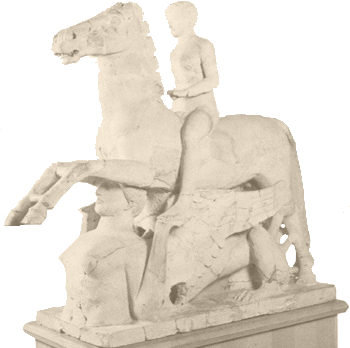|
|
Brought
back to light during the 1910 excavation campaign led by
archaeologist Paolo Orsi in the area of the so-called Temple of "Casa Marafioti",
this remarkable statue group in polychrome terracotta,
representing a young rider held by a sphynx, has been dated
back to the second half of the V century b.C. and, as it was
already noted by Orsi himself, probably belonged to the
acroterion decoration of the Temple of "Casa Marafioti".
[...] non č da dubitare che esso decorasse il sommo fastigio
del tempio e fosse disposto lungo l'asse principale del
colmo del tetto; era cioč un acroterio principe [...]
[...]
it is not to be doubted that it decorated the highest apex
of the temple pediment and was placed along the main axis of
the roof ridge; therefore it was a central acroterion [...]
(Paolo Orsi, Notizie degli scavi di antichitŕ, Serie V, Vol.
VIII - Supplemento 1911 - Roma 1912, Pag. 47)
Regarding the identification of the young rider, it is
supposed that he could be a Dioscuros, as already suggested by Paolo Orsi
right after the discovery of the statue group; such identification is
regarded as very likely also by contemporary scholars, however due to the
existence of some unsolved interpretative issues, the work is
commonly referred to as The Riding Ephebe or Young
Rider,
also known as Marafioti Horseman.
During the years
following the discovery and under Orsi's supervising, the statue (that was
found broken in more than 180 pieces of different size) was reassembled
and underwent a first restoration which provided the integration of the
missing parts.
|
 |
|
|
|
It was later involved in small and sporadic works of
conservative restoration, but only recently (from June 2015
to March 2016) and thanks to the meticulous restoration work
carried out by
Giuseppe Mantella and Sante Guido, with the supervision of
Simonetta Bonomi (scientific project leaders:
Rossella Agostino and Maurizio Paoletti) it has been
possible to bring back the Marafioti Horseman to its former
glory while, at the same time, paying the deserved tribute
to its unknown maker. Nowadays the statue is preserved at the National Museum
of Reggio Calabria along with many other archaeological finds
discovered in the area of the Temple of "Casa Marafioti". |
|

